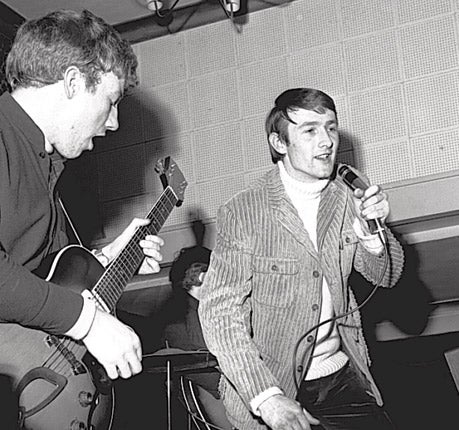Crispian St Peters: Pop singer whose Sixties hits included 'The Pied Piper'

A respected singer-songwriter whose most enduring recordings were penned by others, Crispian St Peters remains an enigma of mid-1960s pop music. He scored two Top Ten entries in 1966; the second of these, "The Pied Piper", was also a huge success in North America. Moreover, an attendant album, Follow Me, elicited covers of St Peters compositions by such disparate artists as Ken Dodd, Darrell Glenn and, most spectacularly, Marty Kristian – whose "I'll Give You Love" (which St Peters also produced) was a hit in Australia.
Such distant triumphs had not belonged even to speculation when Peter Smith left Swanley Secondary Modern, Kent in 1954 to be an assistant cinema projectionist. The younger of musical parents' two sons, he was already an accomplished guitarist, making his own instruments for use on stage with The Hard Travellers, a skiffle outfit whose repertoire contained Smith originals.
Some of these survived when, after two years' National Service in the army he fronted Beat Formula Three, who were discovered in late 1963 by David Nicolson, an EMI publicist. He offered Smith – singled out as the trio's X-factor – his services as manager, and suggested a stage alias, Crispin Blacke, in keeping with a saturnine image similar to that of Dave Berry. This was dropped when, after much debate, Nicolson settled on Crispian St Peters and deducted five years from his client's age.
Thus packaged, St Peters was signed to Decca on a lease contract in 1965. This commenced inauspiciously with two flops, "At This Moment" and, despite heavy plugging on pirate radio, "No No No". Then Nicolson stumbled upon a sounder vehicle for a chart breakthrough in "You Were On My Mind", a US million-seller by We Five. In a frantic effort to find the cash to get a version by an initially disinclined St Peters on disc before We Five's left the runway in Britain, Nicolson decided to share his stake in Crispian with Ken Pitt, best recalled nowadays for managing Manfred Mann and David Bowie.
Nicolson's judgement about "You Were On My Mind" proved correct, and who could not empathise with the team's disappointment when its passage to No 1 was blocked only by The Overlanders' cover of the Beatles' "Michelle", just as St. Peters touched the ceiling of his domestic impact with a scream-rent slot in April 1966's New Musical Express Poll-winners Concert?
Conspicuously absent from this event was PJ Proby, fallen from grace after the famous trouser-splitting incident during a national tour. Briefly, St Peters was prime candidate to fill the void. The strategy backfired, however, when he was described as "the Cassius Clay Of Showbusiness" after his widely reported comments – a misconstruing of flippant remarks – about how he was going to be bigger than both Elvis Presley and The Beatles three years hence.
Though this coverage was to damage him in the long term, it seemed at first as if no harm had been done. Another US item, "The Pied Piper" by The Changin' Times, climbed almost as high as its predecessor after a lyrical adjustment: the "I'll show you where life's at" hookline became the trendier "I'll show you where it's at". Any signs of commercial danger were mitigated, too, by St Peters' popularity overseas, particularly in Australasia, the Far East and, crucially, the States, where a peak of No 4 with "The Pied Piper" was followed by the return of "You Were On My Mind" to the Top 40.
The decline began when "Changes" (a ballad by the protest singer Phil Ochs) was a relative miss at home. Attempts at relaunch included the 1967 A-side, "Free Spirit" – another from the Changin' Times' portfolio – and reinvention as a country-and-western performer, notably on a 1970 album, Simply... Crispian St Peters. Later, St Peters was well-received and fondly remembered on the Swinging Sixties nostalgia circuit, but a private life troubled by divorce and gathering infirmity motivated him to concentrate on writing and arranging for others. Yet, until retiring as a professional entertainer in 2001, he extended a sporadic recording career that embraced a 1990 remake of "The Pied Piper" in a voice drained of 1966's buoyant optimism.
Alan Clayson
Robin Peter Smith (Crispian St Peters), singer and songwriter: born Swanley, Kent 5 April 1939; married (marriage dissolved; one son, one daughter); died Swanley 8 June 2010.
Join our commenting forum
Join thought-provoking conversations, follow other Independent readers and see their replies
Comments
Bookmark popover
Removed from bookmarks